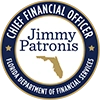2020 Press Releases
**Consumer Alert** CFO Jimmy Patronis: Beware of Sweepstakes Scams
Sep 20, 2023, 09:38
by
Megan Perry-Thibault
Today, Chief Financial Officer (CFO) Jimmy Patronis is highlighting a recent article by the Federal Trade Commission (FTC) that is advising consumers to stay away from, “You’ve Won! Now Pay Us” sweepstakes or lottery related scam advisements that aim to defraud Florida consumers.
TALLAHASSEE, Fla. – Today, Chief Financial Officer (CFO) Jimmy Patronis is highlighting a recent article by the Federal Trade Commission (FTC) that is advising consumers to stay away from, “You’ve Won! Now Pay Us” sweepstakes or lottery related scam advisements that aim to defraud Florida consumers.
CFO Jimmy Patronis said, “As Floridians are continuing to deal with the financial effects of COVID-19, it could be easy to fall for a scammer who is claiming that you won a big prize. Unfortunately, scam artists tend to prey on consumers during difficult times and I’m urging all Floridians to not believe the hype. Legitimate, well-known sweepstakes or lottery organizations will never notify winners in advance and will never ask you to pay a ‘processing fee,’ or ‘shipping and handling charges,’ to claim your prize. Always remember to stay vigilant and never give out your personal information and if it sounds too good to be true, it probably is. If you are suspicious of fraud, report it immediately at FraudFreeFlorida.com.”
According to the FTC, below are three tips on how to avoid this scam:
1. Legitimate sweepstakes don’t make you pay a fee to get your prize. That includes paying "shipping and handling charges," or “processing fees.” There’s also no reason to give someone your checking account or credit card number in response to a sweepstakes promotion.
2. Don’t send money transfers or gift cards or give personal information. Sending money transfers or gift cards (or providing the gift card numbers) is like sending cash: once the money’s gone, you can’t trace it or get it back. The same goes for sending money by mail or using a money order.
3. Don’t trust your caller ID. Scammers can make any name or number show up on your caller ID. They might use an official-sounding name that sounds similar to “Publishers Clearing House” or “Reader’s Digest.”
CFO Jimmy Patronis said, “As Floridians are continuing to deal with the financial effects of COVID-19, it could be easy to fall for a scammer who is claiming that you won a big prize. Unfortunately, scam artists tend to prey on consumers during difficult times and I’m urging all Floridians to not believe the hype. Legitimate, well-known sweepstakes or lottery organizations will never notify winners in advance and will never ask you to pay a ‘processing fee,’ or ‘shipping and handling charges,’ to claim your prize. Always remember to stay vigilant and never give out your personal information and if it sounds too good to be true, it probably is. If you are suspicious of fraud, report it immediately at FraudFreeFlorida.com.”
According to the FTC, below are three tips on how to avoid this scam:
1. Legitimate sweepstakes don’t make you pay a fee to get your prize. That includes paying "shipping and handling charges," or “processing fees.” There’s also no reason to give someone your checking account or credit card number in response to a sweepstakes promotion.
2. Don’t send money transfers or gift cards or give personal information. Sending money transfers or gift cards (or providing the gift card numbers) is like sending cash: once the money’s gone, you can’t trace it or get it back. The same goes for sending money by mail or using a money order.
3. Don’t trust your caller ID. Scammers can make any name or number show up on your caller ID. They might use an official-sounding name that sounds similar to “Publishers Clearing House” or “Reader’s Digest.”
